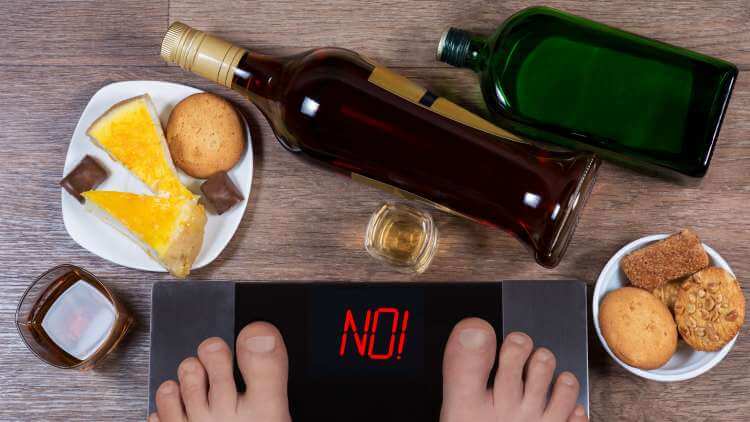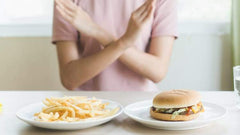
Alcohol and Weight Loss - The Shocking Truth
The link between alcohol and weight loss issues are well-documented in scientific circles, yet many ordinary people are unaware of the real facts. Drinking alcohol is ingrained in our culture – and a daily or weekly habit for many people. But if you’re trying to lose weight, this seemingly harmless activity may actually be sabotaging your results. In this article, we look at the shocking truth behind alcohol and weight loss failure.
Does alcohol prevent weight loss?
The simple (and inconvenient) truth is yes, in many cases, alcohol does stop you losing weight. Even if you’re eating all the right things and exercising regularly, you can be caught out by alcohol consumption. Many don’t realize that one gram of alcohol contains 7 calories, which is almost as much as pure fat! So even a little alcohol can lead to people consuming more calories than they realise and leave them feeling that they just can’t shift that unwanted weight.
But that’s not the only way alcohol prevents weight loss. It’s actually a toxin, so your body tries to expel it as fast as possible. This means that when you consume alcohol, your metabolism will switch to burning it as a main fuel instead of carbohydrates or fat. This results in other fuel sources building up and getting stored – which also causes excess weight gain.
Armed with this knowledge, it’s easy to see why alcohol can be catastrophic for dieters.
Does alcohol make you eat more?

Drinking alcohol affects how your mind makes decisions and leaves you more likely to make poor food choices. This is why people often give in to urges for junk food like pizza after a night on the town. It can be much harder to resist unhealthy temptations when your mind isn’t operating at its best. Studies on animals have suggested that alcohol actually triggers hunger signals within the brain which may cause us to eat more than we need.
It can also lead to overeating in indirect ways. Drinking alcohol before bed will reduce the quality of your sleep which makes you more prone to snacking the next day. It can even cause hormonal imbalances that affect how hungry or full you feel and make you susceptible to overeating.
All of these factors highlight how the link between alcohol and weight loss is much more complex than just worrying about the calories it contains.
What’s a ‘beer gut’?
A beer gut isn’t reserved just for those who drink beer. In fact, having a ‘beer gut’ can actually result from drinking any type of alcohol, including wines and spirits. Calories that aren’t burned will be stored as body fat or glycogen which also increases the amount of water your body holds on to.
Excess weight is often accumulated in the abdominal area which is why drinking alcohol can lead to a beer gut. Some people are also less able to digest the sugars in alcohol which leads to bloating. This too can contribute to the appearance of a bulging ‘beer belly’.
How many calories are in alcohol?
There are 7 calories in a gram of alcohol but how much does this equate to in real drink terms? Here’s a list of the calorie content of the most popular alcoholic drinks:
- Red wine – 5-ounce glass – 125 calories
- Beer – 12-ounce can – 155 calories
- Double vodka & coke – 168 calories
- Mojito – 242 calories
- Long Island Iced Tea – 424 calories
Which alcohol is best for weigth loss?
The simple answer is that alcohol and weight loss do not mix. Whether you’re drinking beer, wine, or spirits, your metabolism will still be affected and calories will soon add up. But if you can’t quite bear the thought of going without alcohol altogether, there are some steps you can take to make it less fattening.
The best alcohol for weight loss is to sip on a spirit without any mixers. Vodka, whiskey, tequila, and brandy all contain 100 calories per 1.5 ounce serving. Drinking them neat will generally slow down how much you drink which will decrease your overall consumption throughout the night.
How much weight will I lose if I stop drinking?
This will depend on your starting weight, how much you were drinking to begin with, and your alcohol-related eating habits. Someone who drinks a small glass of wine every night and a bottle on weekends could reduce their weekly calories by 1500 if they stopped drinking alcohol altogether. Likewise, someone who sinks 6 pints while watching the weekend sports could cut 1250 calories by ditching the alcohol. That’s before you consider the calories in late-night snacks and hangover cures that will no longer be needed.
In both of these examples, the calories ‘saved’ could equate to losing around 1-2lbs of fat per month. It may seem like a small amount, but if you’re changing your diet too, there will be additional calories ‘saved’ and of course even more weight lost.
What will a 1-month break from alcohol do for me?
People often take a 1-month break from drinking as part of a charity initiative such as ‘Dry January’, or perhaps a no alcohol weight loss program. Many report losing weight without changing any other aspects of their lifestyle and notice a significant reduction in their beer gut. Improvements in memory, sleep quality, and overall energy levels are also common. Alcohol can disrupt your brain’s ability to store and recall memories, but abstinence appears to reverse the effects within days. It also affects your sleep cycle, specifically the deepest part of your sleep (REM) which is essential for the body to fully recover for the next day. Many people notice better sleep quality immediately, although some find it harder to initially drop off. Better sleep combined with fewer toxins means your body feels more energized overall within a couple of days.
Will alcohol stop weight loss pills working?
Alcohol and weight loss aren’t really compatible, but it won’t stop weight loss pills such as PhenQ working. In fact, appetite suppressants can be helpful in resisting the urges to eat junk food after a night out or if you’re hungover. However, alcohol may interact with some ingredients in diet pills so it’s important to read the label carefully.
How can I lessen the damage caused by alcohol to my diet?
Firstly, consider the amount of alcohol you’re drinking overall. The higher the proof of your drink, the more alcohol and therefore calories it will contain per ounce. You’ll also need to account for the total amount you consume. For example, whiskey may be higher proof than beer, but if you’re only sipping a single shot instead of downing a pint then it’s obviously better for your waistline.
Mixers such as soda and fruit juice can also contribute to excess calories and halt weight loss. Orange juice, coke, and even tonic water can double or triple the calorie-content of a drink. So, make smart choices about what you mix – or whether you have them at all.
If you’re someone who overeats as a result of alcohol, take positive steps to reduce the impact. Have healthy low calorie snacks on hand at the end of a night out so you don’t reach for a pizza or kebab. Make yourself a nutrient-rich smoothie the next morning instead of a greasy fried breakfast. Being proactive and organized can help to lessen the damage caused by alcohol.
Taking an appetite suppressant like PhenQ can be a good step to take to help curb unhealthy cravings. It can also boost your energy if you’re feeling tired after a night on the town. Plus, it’s fat-burning properties can help you to repair any damage you’ve done by going overboard on the margaritas.
Did cutting back on alcohol lead to weight loss for you? We’d love to hear about it in the comments below!




